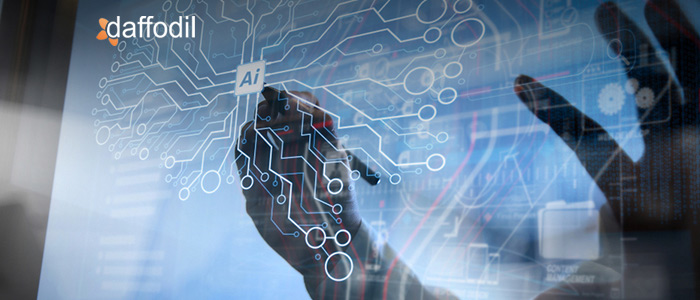
The exponential growth and development that AI technology has showcased in the past two decades have brought several science fiction movies into reality. Statistics suggest that the global AI market is predicted to reach $190 billion by 2025. The overall market includes a wide array of AI applications including Natural Language Processing, Machine Learning, Conversational AI, Robotic Process Automation, Neural Networking, etc. | Source: Statista
What is unique and appreciable about AI is -it has got use cases for everyone, for every industry. Healthcare, finance, agriculture, retail, travel, entertainment, food tech, logistics, real estate are some of the sectors that are rigorously and creatively making use of Artificial Intelligence, Machine Learning and its technologies.
With such popularity and impact, it is quite evident for technology to create trends. In this blog post, we are going to discuss the AI trends that are floating around in the business world. Let’s get started.
1. AI for Combating the COVID-19 Effect
Artificial intelligence and its technologies (especially Machine Learning) have been playing a significant role in understanding and addressing the COVID-19 crisis. It is the healthcare sector that has made the most of this modern technology to control the spread of infection, accelerate its detection & treatment, accelerate research, etc. The following article gives an overview of how AI technology is enabling the healthcare system to mitigate the impact of the COVID-19 pandemic.
READ MORE: How Artificial Intelligence is Helping Fight the COVID-19 Pandemic
Not just healthcare but other industries such as travel, F&B, eCommerce, etc. are utilizing AI to sustain in the market and survive the competition. For example, several restaurants are using robots to create a contactless dining experience. A tech company in China created an AI system that uses infrared to predict passengers’ temperature at the Beijing Qinghe railway station. Likewise, the necessities developed from the COVID pandemic gave rise to various innovative inventions (that are not limited to healthcare).
2. Ethical AI: AI with Moral Values
With advances in machine learning and neural networks, AI technology has gotten into some sensitive domains such as healthcare, hiring, finance, etc. Over time, several ethical controversies surround Artificial Intelligence. For example, The US Department of Housing and Urban Development sued Facebook for violating the Fair Housing Act. Facebook’s ad-serving algorithm allowed advertisers to limit housing ads based on characteristics such as race, gender, etc.
Another example is Amazon’s recruitment tool. Their experimental hiring tool used AI to score candidates (from one to five stars) based on their experience. However, the company realized that the recruitment tool wasn’t rating candidates for technical posts (like software development) in a gender-neutral way. The system was biased against female applicants.
To deal with such limitations of AI solutions, there is Ethical AI. When a system is developed using ethical AI guidelines, it takes care of factors such as privacy, individual rights, non-manipulation, and non-discrimination. Ethical AI is important to ensure that the potential of AI is utilized only for the good. For example,
- The AI system should not create or reinforce any unfair bias
- The AI system should incorporate privacy design principles
- The AI system should be socially beneficial and have a transformative impact
3. AutoML to Simplify ML Model Development
The traditional approach to ML model development is resource-intensive, requires mathematical expertise, computer science skill, and significant domain knowledge. It invites countless opportunities for human error and bias, which can degrade model accuracy and insights received from it. Also, it needs a lot of time to produce and compare multiple ML models to produce one that is the closest match to the requirement.
Automated Machine Learning (AutoML) is a great alternative to the traditional model development process. AutoML, as the name suggests, automates the time-consuming and iterative tasks that are involved in the development of ML models. Automated machine learning is the process that allows developers, data scientists, and analysts to build highly efficient, production-ready ML models by running systematic processes on raw data and selecting models that have the most relevant data.
4. Multi-Modal Learning of ML Algorithms
Just imagine this. A patient’s healthcare information has clinical trial forms, scanned documents, genetic sequencing reports, etc. How information is presented to the physician or specialist can go a long way in improving medical diagnosis.
Suppose, there is an ML model that’s trained using computer vision and optical character recognition. This multi-modal algorithm will help in better presentation of the PHI and thus help the physician to understand the health condition of the patient in a better manner. Multi-modal learning is the process of combining text, speech, vision, and IoT sensor data to create a single ML model.
5. TinyML: Machine Learning for Embedded Systems
TinyML is an intersection between machine learning and embedded devices. It focuses on types of models that run on small and low-powered devices such as microcontrollers. It enables low-latency, low power, and low bandwidth model inference at edge devices.
Tiny machine learning models enable low power, low bandwidth, and low latency at the edge devices. Since microcontrollers consume little power, they can remain charged for a longer period of time.
Tiny ML has use cases in almost every industry. For example, in the healthcare sector, the Solar Scare Mosquito project helps in curbing the spread of viruses for Dengue, Zika Virus, Chikungunya, etc. Similarly, agriculture, predictive maintenance, healthcare, are some of the industries that utilize the TinyML concept.
Planning to build an AI System for your Business?
Artificial intelligence has got limitless advantages for business. When the potential of AI combines with the right business requirement, it leads to a transformative impact.
The AI trends that we have shared above highlights the advances in technology that are ready to deliver a disruptive output. Our AI development team adopts the most beneficial application of AI to build future-ready AI solutions.
If an AI solution is on your business roadmap, then it would definitely be a great idea to connect with our AI development specialists who would help you to understand AI applications for your business and suggest the most appropriate AI technologies that could be a part of your project. To talk to our AI experts, schedule a 30-minute free consultation with them.



